Life Of Moses
Lesson 1.14
The life of Moses is an incredibly important epoch in the history of Jesus Christ. Who was Moses? Well, for starters, he was one of God's chosen prophets used greatly in the story of the Hebrew nation and Christianity.
Please read Exodus 2:11-3:14 before starting GraspingGod.com's free Bible study lessons, #1.14
Previous lesson: Abraham Bible Study #1.13
Preliminary Bible Study Questions:
1) Did Moses murder a man?
2) What took place when Moses first met God?
3) Where did Moses receive God's Ten Commandments?
Life Of Moses
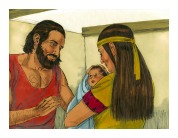
The life of Moses is captivating even from his birth in Egypt. While the Hebrew people were working in slavery in Egypt for nearly 400 years, God raised up a prophet to lead them to the Promised Land. God actually revealed to Abraham that the nation arising from him would find themselves in captivity for 400 years (Genesis 15:3).
In answer to the oft-asked question, "When did Moses live?" The best historical answer is that Moses was born in 1525 BC, give or take a year. Moses died in 1405 BC at 120 years of age.
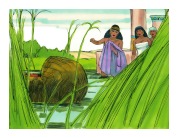
Birth Of Moses
The birth of Moses is a story in it's own right. Pharaoh had recently decreed that all male Hebrew babies are to be killed at birth because the Hebrews were multiplying at an astounding rate. He was paranoid that his valued slave nation would grow too large, and revolt in the future.
Moses was born secretly and safely to Amran, his father, and Jochebed, his mother, and was kept hidden for three months. Pharaoh's daughter amazingly discovered Moses floating in the reeds along the banks of the Nile River. His mother earlier placed Moses in a basket made of papyrus reeds.
Moses' sister, Miriam, watched as the princess cared for the baby. By God's grace, the princess found Moses' mother, and allowed her to raise him for a time. He was eventually brought back to the princess and lived in the palace throughout his younger life.
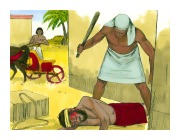
Youth of Moses
The life of Moses had many twists and turns because of the fact he was raised by royalty. He was actually a prince in line for the throne of Pharaoh, because of his adoption by the princess. His education and physical health would have been excellent because of his royal privileges. God had another nation in mind for Moses to lead, though. Let's take a look.
Moses Flees Egypt
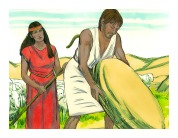
The life of Moses took another turn when he was around 40 years of age. He became angry at one of the Egyptian slave-masters who had beaten a Hebrew man. Moses killed him and buried him in the sand.
He soon discovered that the murder had become known, so he fled to the desert of Midian, opening up a new chapter in Moses' life. The area he fled to was an area we now know of as northwest Saudi Arabia.
Moses became a shepherd in the land, and married the daughter of Jethro, a Midianite priest (Exodus 2:16-22). Moses and Zipporah bore two sons, Gershom and Eliezer. The time in the desert taught Moses many important skills that he would need for the coming Exodus of Israel.
Moses and the Burning Bush
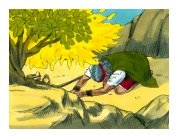
One day Moses was shepherding, and he was surprised to see a burning bush, which wasn't being consumed by the fire. So, about the time Moses was going to investigate, the Angel of the Lord shouted, "Moses, Moses!" This was no ordinary angel. The pre-incarnate Christ was in the midst of the burning bush talking to Moses.
God told Moses from the burning bush that he had heard the cries of the captive Hebrews. He now had a plan to lead them out of Egypt and bring them to the Promised Land. Moses was part of the plan.
So, the life of Moses takes yet another turn, and one that Moses doesn't seem too fond of. He did all he possibly could to flee from the task of leading Israel out of Egypt, but God wouldn't hear any of it, with the exception that he allowed Aaron to go with Moses. God wasn't too thrilled with Moses' attitude about the calling on his life (Exodus 4:13-17).
Moses and the burning bush incident has illustrated a person who has struggled with the call of God. Have you ever considered a call into God's service? Never say never! You can do all things through Christ who strengthens you!
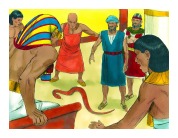
The 10 Plagues Of Egypt
God used the staff of Moses (aka The Rod of God) to prove that he is the Almighty; and secondly, as the instrument Moses would use to perform the many upcoming miracles. I think God used it as a crutch for Moses' faith too, don't you? After a tense journey from Midia back to Egypt, Moses and Aaron gathered the Israelite elders and told them of God's plan, while also showing them miracles. The group believed and worshiped God (Exodus 4:31).
Moses and Aaron visited Pharaoh, and shared, "Thus says the Lord God of Israel: 'Let my people go!"' Not only did the Pharaoh refuse, but he invoked harder labor for the Hebrew slaves. A revolt smoldered beneath the surface against Moses and Aaron that created friction between Moses and God. Aaron became the spokesman to Pharaoh, and a battle of miracles between the two men and Pharaoh's magicians ensued.
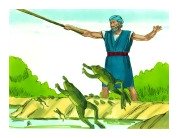
When asked again to let the Hebrews go, Pharaoh refused because his heart had been hardened by God (Exodus 7:13). After a third refusal the next day down at the Nile River, Pharaoh refused them again.
Thus began a series of ten plagues of Egypt that would go down in Egyptian infamy. After each biblical plague cursed the nation, Pharaoh grew a harder heart, and continued his refusal. Here is a List of the Ten Plagues of Egypt:
The 10 plagues of Egypt:
1) Plague of Blood (Exodus 7:20)
2) Plague of Frogs (Exodus 8:6)
3) Plague of Lice (Exodus 8:17)
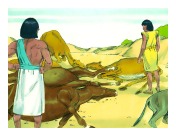
4) Plague of Flies (Exodus 8:24)
5) Plague of Livestock Disease (Ex. 9:6)
6) Plague of Boils (Exodus 9:10)
7) Plague of Hail (Exodus 9:23)
8) Plague of Locusts (Ex. 10:13)
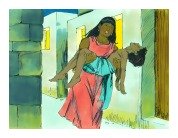
9) Plague of Darkness (Ex. 10:22)
10) Passover Plagues of the death of the Firstborn Sons and Livestock (Ex. 12:29)
Aaron, Moses and the plagues became too much for Pharaoh. Finally, the tragic loss of the country's firstborn sons led him to allow the Hebrews to leave.
The Hebrew Exodus
The
Passover Meal was instituted at this time, and the Hebrews did as
instructed. The Hebrews were also strictly instructed to wipe their
doorposts with the blood of a spotless lamb. As the Lord swept
through Egypt killing the first born sons and people and beasts that
evening, he would safely "pass over" the homes with the blood (Exodus 12:12-13).
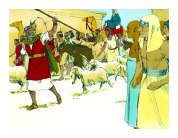
The details in the life of Moses were critical for future generations of religious practice.
After the tenth plague was over, Pharaoh called Moses and Aaron, telling them to take his people and leave Egypt (Exodus 12:31-32). The Hebrew nation quickly packed up, were given many valuables by the Egyptians, leaving the country enmasse. The pre-incarnate Christ led them in a pillar of cloud by day, and in a pillar of fire at night (Exodus 13:21-22).
Moses' Parting Of the Red Sea
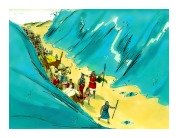
In what could be described as the 11th plague, possibly a plague of stupor, Pharaoh's heart was soon hardened again! He quickly combined all his military forces to pursue, capture, and return the Hebrews to Egypt (Exodus 14:5-6). He sought the life of Moses and all the fleeing Israelites.
This proved foolish because God had a final act of vengeance in store for Egypt. The Hebrews were backed up against the Red Sea and the people were scared. However, God told Moses to wave the rod of God over the Red Sea, which he did.
With Moses' parting of the Red Sea, the Israelites' entire nation crossed through the dry river bed. After they arrived fully to the land on the other side, the Egyptian army decided to continue pursuing their former slaves. Bad choice!
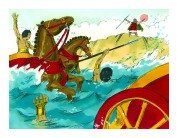
The Lord told Moses to wave his staff over the sea again, which made the water rush over the Pharaoh and his men. The entire Egyptian military drowned in the Red Sea that morning (Exodus 14:27-28).
The Life of Moses in the Wilderness
The Hebrews discovered it wasn't easy to survive out in the desert (Exodus 15:24-25). The people were starving and growing weary of the constant hunger pains. God made provision for them, though, because he opened his storehouses and sent manna from heaven to feed them in the desert in the mornings.
What is manna?! Well, manna from heaven (also called manna bread) is a white bread that angels eat in heaven. Exodus 16:31 says it tastes "like wafers made with honey." God also sent them quail so they could eat meat in the evenings. The food was more than enough to feed the million person entourage.
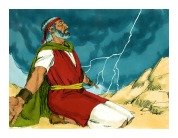
Ten Commandments
There are so many stories of strife between the Israelites and God in this journey that I can't talk about all of them here. Moses, at times, had all he could take from them (Exodus 17:3-4). The Lord finally called Moses up to the top of Mt. Sinai where the Ten Commandments of Moses were issued not once, but twice. The 10 Commandments were first given to him at this time.
Upon his return down the mountainside he saw that Aaron and the Hebrew camp constructed an idol of a golden calf. Moses was so angry with Aaron and the Israelites he threw the 10 commandments tablets. The stone tablets were shattered. God sent a plague upon Israel for their great sin. The life of Moses, specifically the golden calf, can remind us how fickle the faith of God's people can be.
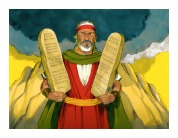
After taking care of the idolatry at the base camp, Moses returned to meet God at the top of Mt. Sinai. God etched, in his own handwriting, a new set of the Ten Commandments of Moses. Moses returned to camp with a glowing face, which shone because he was face-to-face with the Lord.
Moses and the Promised Land
The life of Moses was full of unbelievable (but true!) stories, miracles and the establishment of the chosen nation of Israel. Along the way, the unfortunate story of Moses and the Promised Land developed. Because of his anger at God, he was cursed with this penalty: Moses wasn't allowed to enter the Promised Land.
Most of the older generation were also cursed the same way, because of their constant unbelief and rebellion in the desert. God actually made them stay in the desert another 40 years as punishment. Finally, they camped outside the Promised Land. Moses, by this time, was 120 years of age.
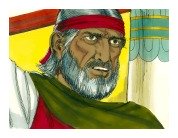
Moses climbed to the top of Mount Nebo, gazing upon the Land of Canaan with delight. He died in good health, and was buried in the valley, by the Lord, himself.
Life of Moses - Grasp This!
Moses is still living, as we discovered at Jesus' Transfiguration (Luke 9:30-33). God is the God of the living, not the dead! (Mark 12:27). Moses, in his glorified body, visited Jesus and his three disciples. He and Elijah discussed Jesus' upcoming crucifixion with him, and then departed to heaven.
You can't make this stuff up, Folks. What an inspirational story - the Life of Moses! We'll get to meet this man in heaven!
Join our next lesson: King David of Israel #1.15
Bible Study Questions:
1) Why did God harden the heart of Pharaoh, so he would refuse to let his people go?
2) God directly talked to Moses. Does he still do the same today with believers?
3) Was it unfair of God to deny Moses the opportunity to enter the Promised Land?
Inspirational Bible Verses:
By faith Moses, when he had grown up, refused to be known as the son of Pharaoh’s daughter. He chose to be mistreated along with the people of God rather than to enjoy the pleasures of sin for a short time. He regarded disgrace for the sake of Christ as of greater value than the treasures of Egypt, because he was looking ahead to his reward.
By faith he left Egypt, not fearing the king’s anger; he persevered because he saw him who is invisible. By faith he kept the Passover and the sprinkling of blood, so that the destroyer of the firstborn would not touch the firstborn of Israel.
By faith the people passed through the Red Sea as on dry land; but when the Egyptians tried to do so, they were drowned. Hebrews 11:24-29
“I tell you the truth, anyone who believes has eternal life. Yes, I am the bread of life! Your ancestors ate manna in the wilderness, but they all died. Anyone who eats the bread from heaven, however, will never die. I am the living bread that came down from heaven. Anyone who eats this bread will live forever; and this bread, which I will offer so the world may live, is my flesh.” John 6:47-51
Faith Quotes!
A little faith will bring your soul to heaven, but a lot of faith will bring heaven to your soul. Dwight L. Moody Quotes
See that your faith brings forth obedience, and God in due time will cause it to bring forth peace. John Owen
The only saving faith is that which casts itself on God for life or death. Martin Luther Quotes
Prayers of Thanksgiving:
Dear Lord. The life of Moses and your chosen nation are so inspiring. I fully believe in the power you displayed through Moses. Have mercy on my ignorance and hard heart. Please lead me out of captivity, Lord, and into your Promised Land. In Christ's name. Amen
After sharing this lesson on Facebook and Twitter below download your FREE printable Bible Study Lessons: Life Of Moses, Lesson 1.14.
Return to History of Jesus Christ page. Return to GraspingGod.com Homepage.
Special Note: I'm grateful to Big Book Media & Free Bible Images for the use of their illustrations for Life of Moses.
